THUNDER BAY - Municipal leaders across Northwestern Ontario are expressing concerns about the capacity to host First Nation evacuees amid the COVID-19 pandemic.
The Northwestern Ontario Municipal Association passed a resolution to send the federal and provincial government a letter asking for a proactive approached to hosting First Nations evacuees.
“At this time, we are trying to be more proactive rather than declaring we can’t take evacuees,” said NOMA president, Wendy Landry. “We are trying to be proactive and collaborative with the provincial and federal government and First Nations leadership to make a plan ahead of time because we just don’t have the capacity in our municipalities to host evacuees at this time.”
The city of Thunder Bay and Kapuskasing have already said they will not be taking in First Nation evacuees at this time due to the COVID-19 outbreak.
Normally around this time of year, spring flooding in Kashechewan First Nation located near James Bay results in hundreds of community members being evacuated to communities across the Northwest.
Last year Thunder Bay hosted more than 200 evacuees from Kashechewan and more than 1,000 people from Pikangikum First Nation in the summer due to the threat of forest fires.
Landry said municipalities across the Northwest are not in a position to host evacuees due to significant layoffs across most sectors, businesses such as hotels being closed, and municipal facilities such as recreational centres and libraries that normally assist evacuees being closed as well.
But even more concerning is the risk of transporting First Nations people to areas where there are confirmed cases of COVID-19.
“You have to take into consideration as well that most of the First Nations other than one have no positive cases,” Landry said. “So you are going to potentially move individual members from their First Nation to a community with positive cases."
Landry added she would like to see the provincial, federal, municipal, and First Nation leadership working together to find solutions in the event First Nations people do need to be evacuated due to flooding or forest fires.
One such option could be housing people in either permanent or makeshift military camps or temporary housing in provincial parks.
“That is why we are asking the federal and provincial government to be at the table to potentially set up military camps or use provincial parks so these individuals can have a safe place to evacuate to,” Landry said. “Municipalities cannot make the decisions when the provincial parks are closed, nor can we fund them. So the federal and provincial government needs to take on those tasks.”
